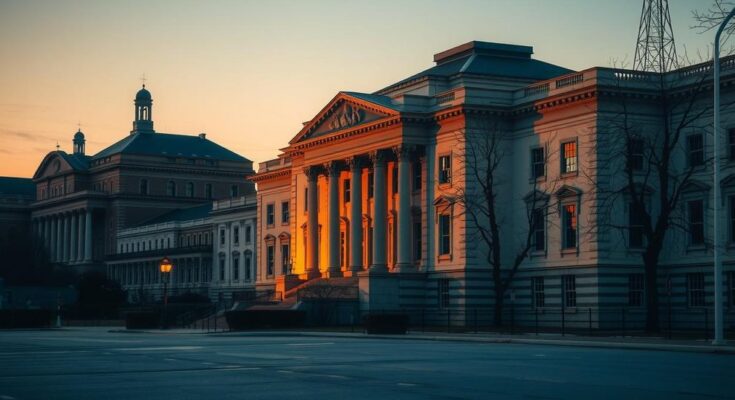Cameroon prepares for elections with 91-year-old President Paul Biya likely seeking an eighth term. Despite health concerns, party support remains strong, while opposition factions remain divided and ineffective. Cameroon’s ongoing civil war and economic difficulties add layers of complexity to this political scenario, highlighting the country’s challenges under Biya’s continued leadership.
As Cameroon approaches its elections later this year, 91-year-old President Paul Biya is likely to seek an eighth term, solidifying his status as Africa’s longest-serving leader. Dr. John Akpo, a political analyst, noted that Biya’s party has expressed strong support for his candidacy despite concerns about his health. Meanwhile, Elvis Ngolle Ngolle from the Cameroon People’s Democratic Movement indicated that discussions on a successor are premature, emphasizing the party’s preparations for the elections.
Biya has been in power for over 42 years; if he is elected again, he would be 99 by the next elections in 2032. Though he enjoys backing from some opposing parties, Akpo questions their loyalty, suggesting they are merely extensions of the ruling party aimed at diluting true opposition. He criticized this political deception, asserting that many Cameroonians feel ashamed of their leadership.
Although Biya is credited with establishing a multi-party democracy and strengthening ties with Western nations, his leadership has faced significant challenges, notably a civil war initiated by Anglophone separatists in the northwest and southwest regions. Tamfu Richard, an opposition lawyer, expressed skepticism about Biya’s capacity to manage ongoing crises due to his age, claiming physical absence from these troubled areas hampers effective governance.
Critics argue that instead of encouraging dialogue, Biya has intensified repression against political dissent, exemplified by his imprisonment of peaceful protestors, including Maurice Kamto. The ruling Cameroon People’s Democratic Movement heavily relies on allies like the Democratic Movement for the Defense of the Republic to maintain its parliamentary majority, yet support for these partners has dwindled, raising concerns about the CPDM’s stability. Despite losing ground, these parties remain integral within the broader coalition formed to counter Kamto’s rising influence.
Recently, Catholic bishops from Buea made headlines discussing the political climate, with some allegedly calling for a transition of power. The bishops’ remarks received backlash from government officials, yet a diocesan spokesperson clarified their message focused on improving citizens’ welfare rather than demanding the president’s resignation. The Church’s substantial influence over the majority Catholic populace could sway public sentiment significantly.
Cameroon’s economic situation remains fragile, with projections indicating a decline in GDP growth, down to 3.3% in 2023 from 3.6% in the previous year, attributed to inflation, fiscal policies, and internal conflicts. While there were signs of recovery in early 2024, poverty levels stagnate, with nearly a quarter of the population living below the international poverty line, compounded by alarming corruption levels.
Many structural challenges, including poor infrastructure and reliance on commodity exports, hinder sustainable economic growth. Analysts agree that addressing these issues is vital for reducing poverty, yet uncertainty looms over the feasibility of such reforms under another Biya term, especially given the fractured opposition’s failure to present credible alternatives. As Michele Ndoki, an opposition lawyer, pointedly remarked, the real concern is Biya’s ability to fulfill his presidential duties effectively amidst these challenges.
The article discusses the political landscape in Cameroon as President Paul Biya, who has been in power since 1982, prepares to run for an unprecedented eighth term despite concerns over his advanced age and health. It outlines the state of the opposition parties, the ongoing civil conflict in the country, and the influence of the Catholic Church on political discourse. The economic situation, characterized by stagnation and high corruption levels, is also highlighted as a critical aspect impacting governance and public welfare. Additionally, the piece reflects the sentiment among some Cameroonians who may prefer stability over change, despite the apparent shortcomings of Biya’s administration.
In summary, the upcoming elections in Cameroon signify a pivotal moment for the nation as President Paul Biya prepares to extend his lengthy rule into a new term. Despite his declining health and advancing age, Biya retains considerable party support, while the fragmented opposition struggles to offer viable alternatives. Economic challenges and civil unrest further complicate the political scene, raising questions about the country’s future stability under continued Biya leadership.
Original Source: www.dw.com




